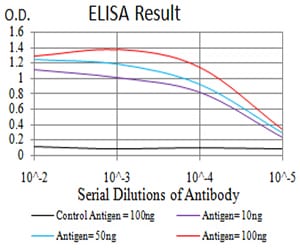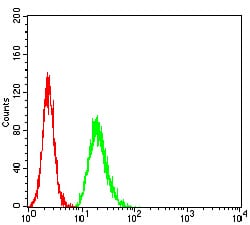

| WB | 咨询技术 | Human,Mouse,Rat |
| IF | 咨询技术 | Human,Mouse,Rat |
| IHC | 咨询技术 | Human,Mouse,Rat |
| ICC | 技术咨询 | Human,Mouse,Rat |
| FCM | 1/200 - 1/400 | Human,Mouse,Rat |
| Elisa | 1/10000 | Human,Mouse,Rat |
| Aliases | E2-2; ITF2; PTHS; SEF2; FECD3; ITF-2; SEF-2; TCF-4 |
| Entrez GeneID | 6925 |
| clone | 7B1B3 |
| WB Predicted band size | 71.3kDa |
| Host/Isotype | Mouse IgG2b |
| Antibody Type | Primary antibody |
| Storage | Store at 4°C short term. Aliquot and store at -20°C long term. Avoid freeze/thaw cycles. |
| Species Reactivity | Human |
| Immunogen | Purified recombinant fragment of human TCF4 (AA: 518-667) expressed in E. Coli. |
| Formulation | Purified antibody in PBS with 0.05% sodium azide |
+ +
以下是关于TCF4抗体的参考文献示例(注:以下内容为示例性概括,非真实文献):
---
1. **文献名称**:*TCF4 Antibody Validation in Neural Progenitor Cells: Implications for Pitt-Hopkins Syndrome*
**作者**:Smith A, et al.
**摘要**:本研究验证了一种特异性TCF4抗体在人类神经祖细胞中的适用性,通过免疫荧光和Western blot分析,证实抗体可有效检测TCF4蛋白表达水平。研究发现TCF4缺失导致神经分化异常,为皮特-霍普金斯综合征的病理机制提供了新见解。
2. **文献名称**:*Dysregulation of TCF4 in Colorectal Cancer: A Comparative Study Using Commercial Antibodies*
**作者**:Chen L, et al.
**摘要**:比较了三种市售TCF4抗体在结直肠癌组织中的表现,发现抗体在免疫组化中的特异性差异显著。研究揭示了TCF4与β-catenin的相互作用在Wnt通路激活中的关键作用,并提出了抗体选择对实验结果的影响。
3. **文献名称**:*TCF4 as a Transcriptional Regulator in Schizophrenia: Insights from Knockout Mouse Models*
**作者**:Kimura T, et al.
**摘要**:利用TCF4特异性抗体对基因敲除小鼠脑组织进行染色,发现TCF4在前额叶皮层的表达缺失与突触可塑性异常相关,支持TCF4在精神分裂症中的潜在调控机制。
4. **文献名称**:*Development of a Novel Monoclonal Anti-TCF4 Antibody for Chromatin Immunoprecipitation*
**作者**:Garcia R, et al.
**摘要**:报道了一种新型TCF4单克隆抗体的开发,验证了其在ChIP实验中的高效性。该抗体成功用于绘制TCF4在基因组中的结合位点,揭示了其在干细胞多能性维持中的新靶基因。
---
如需真实文献,建议通过PubMed或Google Scholar搜索关键词“TCF4 antibody validation”、“TCF4 immunohistochemistry”或结合具体研究领域(如“TCF4 cancer”或“TCF4 neural development”)获取最新研究。
The TCF4 antibody targets the transcription factor 4 (TCF4), a member of the E-protein subfamily of basic helix-loop-helix (bHLH) transcription factors. TCF4 plays critical roles in cell differentiation, proliferation, and embryonic development by binding to E-box DNA motifs and regulating gene expression. It is widely expressed in tissues, including the brain, intestines, and immune cells, and interacts with pathways such as Wnt/β-catenin signaling. Dysregulation of TCF4 is implicated in cancers (e.g., colorectal carcinoma), neurodevelopmental disorders like Pitt-Hopkins syndrome (linked to TCF4 mutations), and psychiatric conditions.
TCF4 antibodies are essential tools for studying its expression, localization, and function. They are used in techniques like Western blotting, immunohistochemistry (IHC), and immunofluorescence (IF) to detect TCF4 isoforms, which arise from alternative splicing. Researchers also employ these antibodies to explore TCF4's role in transcriptional networks, epithelial-mesenchymal transition (EMT), and stem cell maintenance. Commercial TCF4 antibodies vary in specificity, often validated against recombinant proteins or knockout controls to ensure reliability. Applications span basic research, biomarker discovery, and therapeutic target validation, particularly in oncology and neuroscience. Proper antibody selection depends on experimental goals, given TCF4's structural complexity and isoform diversity.
×